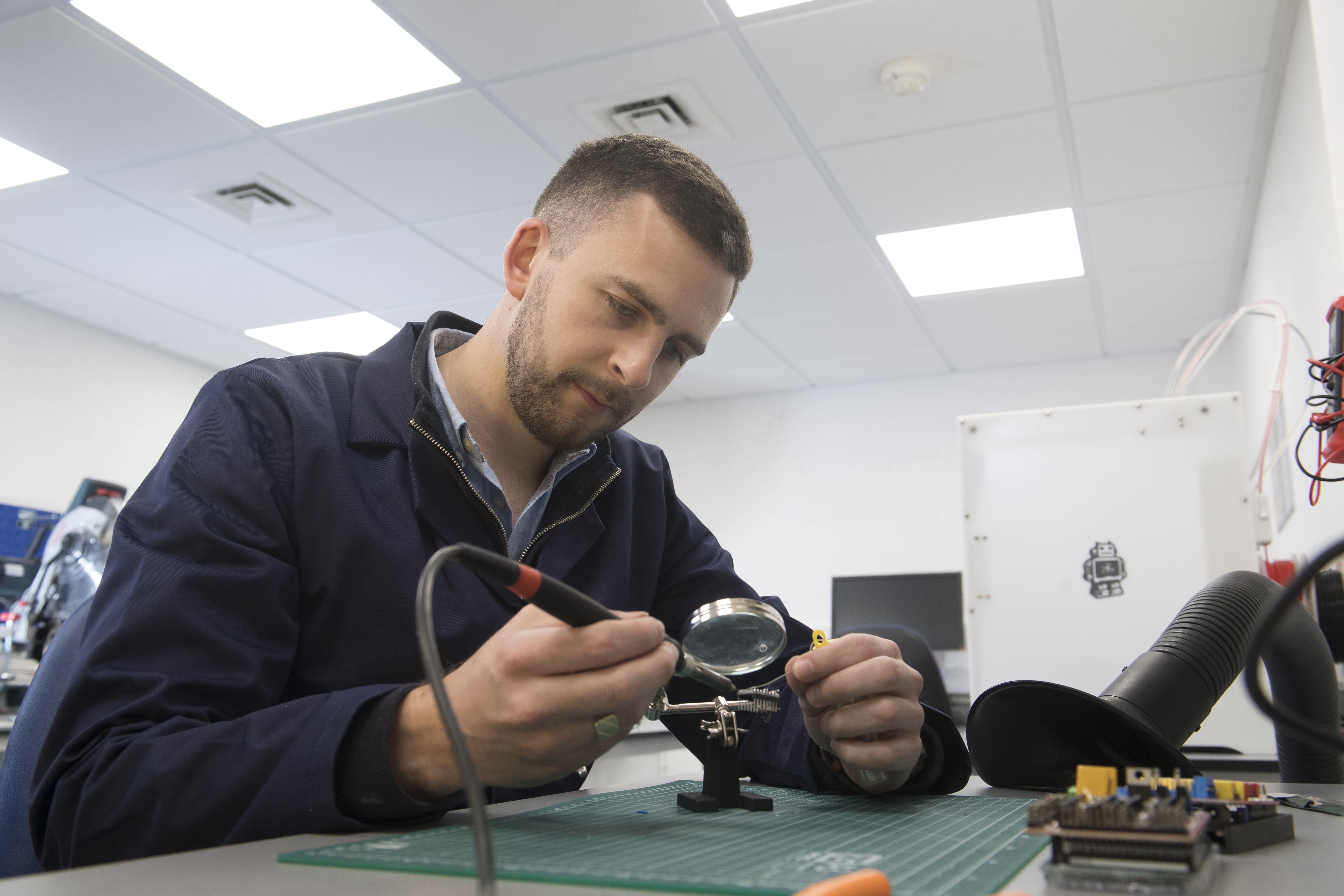
April 9, 2019, by Lexi Earl
Meet the Beacon: Dr Jonathan Atkinson
Jon Atkinson is a Senior Research Fellow and Technologist in Phenomics for the Future Food Beacon. As well as conducting his own research, his role is designed to help other researchers do their research by developing phenotyping equipment and kit. He will be working in the dedicated makerspace that has been developed within the Future Food Beacon. His previous research was focused on wheat roots, examining ancient relatives of wheat, and phenotyping cross breeds of modern wheat with ancient varieties.
Tell me about your role here?
My job is to be there as a service, and help people with their plant phenotyping problems: to build pieces of kit, to help other researchers with that. So if someone has something they want to do, I can help by building a piece of kit to do that. We have a lot of resources in the maker space with tools and 3D printers, that will help with that process. I am also continuing my own research work, in the area of root physiology and root soil interactions.
How did you become involved in this kind of work?
I fell into it a little bit. I did my undergraduate, my PhD and my postdocs at Nottingham. While I’ve been doing that I was always developing phenotyping kit for whatever project I’ve done.
What are you researching?
I’ve always worked on wheat before now, so all my previous projects were wheat-root related in some way. I’ve always specialised in looking at ancient relatives of wheat. Wheat is really genetically bottle-necked because it has a complicated evolution and it has been domesticated. That has forced it down a certain path which means the variation is quite a lot less than other crop species. Ian and Julie King run a programme where they take relatives of wheat, ancient varieties, and cross it into modern wheat to try and bring back more genetic variation. I will be continuing with this research but also branching into the genetic controls of root architecture.

How do you describe what you do to an ordinary person?
It is looking at an organism to observe it’s characteristics, and then you try and relate that later back to something genetic that you can manipulate or understand. Most of it is just clever ways to observe things or measure them.
What kinds of things do you design to help researchers do their work?
It covers all sorts. The simplest things will just be camera rigs, pointing the camera or sensor at an experiment to acquire data at certain intervals. There are different levels of that, you can get robotics, things like XY gantries that move over plants, image canopies, glasshouse robotics, robotic arms, different types of imaging. It can be small things too, like flow cells.
Why did you decide to move into this role and join the Future Food Beacon?
It is kind of like my perfect job! I’ve always loved building things. If I wasn’t doing Plant Science I would probably have been an engineer of some description. I’ve always tried to build and make things. I’ve always tried to add it on to whatever job I’ve done here.
How did you end up in Plant Science?
Complete chance. I did Applied Biology at the University of Nottingham and just liked plant science the most out of my modules. I ended up pushing the focus that way, as much as they’d let me.
How does your research affect ordinary people?
You’d hope that the research outputs from the research in some way would one day affect ordinary people. I think a lot of it depends on application. My previous postdoc was on designing future wheat, which is the BBSRC’s central wheat funding. That is directly applicable. You get stuff going to breeders straight away, whereas other stuff might be 20 years down the line. It all filters in eventually, it’s just the immediacy of it is different.
How does being based within the Future Food Beacon help you achieve your goals for the future?
It’s a cool project. The scope is massive. It is possible to come up with ideas and try and follow something. You’re more flexible to follow whatever comes up. I’ll get involved in loads of different projects as well, bit by bit. It’s a good way to do things, instead of the normal, more rigid structure of a conventional postdoc. You can do more blue sky thinking.
Do you have any advice for others?
If you don’t love the science, it is not a career I would recommend. It is a bit of a slog at times. You have good days, bad days. You might spend six months working on something and the data sucks. You feel like you’ve wasted it. It is not always easy. But if you love the science, it is worth doing. I think I’ve been quite lucky with my career path so far, where I’ve just always fallen into things. It’s hard to give people advice other than just plug away, and be a decent person.
Any career highlights?
Getting this job! There is always the worry that you end up stuck in a postdoc bubble forever, because there are so few positions that go past that.


Thank you for your research.